|
|
|
Sort Order |
|
|
|
Items / Page
|
|
|
|
|
|
|
| Srl | Item |
| 1 |
ID:
154552
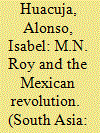

|
|
|
|
|
| Summary/Abstract |
This essay examines the Indian anti-colonial and Leftist activist M.N. Roy's political work in Mexico from 1918 to 1920. It argues that Roy's sojourn in revolutionary Mexico—and in particular the friendships he made there with Leftist intellectuals, some Mexican, many newcomers to Mexico—played an important role in shaping his political trajectory. Not only did Roy become a communist in Mexico, but he and his colleagues, concerned with the ‘universal’ struggle of the working class, dismissed ideas about national identity brewing during the Mexican Revolution and its aftermath. Roy's distaste for national pride also defined his later political work in India.
|
|
|
|
|
|
|
|
|
|
|
|
|
|
|
|
| 2 |
ID:
109856
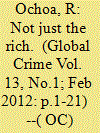

|
|
|
|
|
| Publication |
2012.
|
| Summary/Abstract |
This article explores the development of kidnapping in Mexico City. New evidence suggests that this crime has evolved from a crime that until recently targeted mostly the wealthy to one that now targets mainly middle- and working-class individuals. This is counterintuitive since, arguably, kidnapping is a costly crime to plan and execute and is thus better suited for a once-off large payoff. Typical explanations of high crime rates and other criminal phenomena in Latin America argue that either a weak state or very powerful criminals explain high levels of crime and violence. I argue for a middle-ground approach that looks at the interactions between state, criminals and society to explain the changes mentioned. Using qualitative evidence, I explain this shift in kidnapping along three lines: (1) the successful destruction by the state of older, sophisticated kidnapping gangs; (2) the formal and informal strategies that wealthy individuals designed and implemented to protect themselves from crime; and (3) the failure of the state to impose a strong rule of law. The article concludes by reflecting on the importance of deep structural reform as a way to assure long-lasting drops in crime.
|
|
|
|
|
|
|
|
|
|
|
|
|
|
|
|
| 3 |
ID:
089224
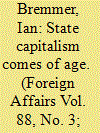

|
|
|
|
|
| Publication |
2009.
|
| Summary/Abstract |
Across the United States, Europe, and much of the rest of the developed world, the recent wave of state interventionism is meant to lessen the pain of the current global recession and restore ailing economies to health. For the most part, the governments of developed countries do not intend to manage these economies indefinitely. However, an opposing intention lies behind similar interventions in the developing world: there the state's heavy hand in the economy is signaling a strategic rejection of free-market doctrine.
|
|
|
|
|
|
|
|
|
|
|
|
|
|
|
|
| 4 |
ID:
116783
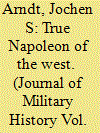

|
|
|
|
|
| Publication |
2012.
|
| Summary/Abstract |
Combined-arms combat divisions emerged fully during the French Revolutionary Wars in the late 1700s. This paper explores how U.S. General Winfield Scott's Mexico City campaign (9 March-14 September 1847) contributed to this military innovation's transatlantic diffusion. It argues that Scott organized the Army of Invasion of Mexico according to the French system of combined-arms divisions, enabling him to replicate the Napoleonic era's aggressive operational tactics. In this way, Scott nullified the Mexican forces' numerical superiority, overcame their fortified defensive positions, and gradually annihilated them, strengthening his claim to be the "Napoleon of the West" and demonstrating that combined-arms divisions were appropriate for the American way of war.
|
|
|
|
|
|
|
|
|
|
|
|
|
|
|
|
| 5 |
ID:
107993
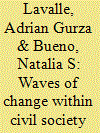

|
|
|
|
|
| Publication |
2011.
|
| Summary/Abstract |
For the past half a century, Latin American scholars have been pointing toward the emergence of new social actors as agents of social and political democratization. The first wave of actors was characterized by the emergence of novel agents-mainly, new popular movements-of social transformation. At first, the second wave, epitomized by nongovernmental organizations (NGOs), was celebrated as the upsurge of a new civil society, but later on, it was the target of harsh criticism. The literature often portrays this development in Latin American civil society as a displacement trend of actors of the first wave by the second wave-"NGOization"-and even denounces new civil society as rootless, depoliticized, and functional to retrenchment. Thus, supposedly, NGOization encumbers social change. The authors argue that NGOization diagnosis is a flawed depiction of change within civil society. Rather than NGOization related to the depoliticization and neoliberalization of civil society, in Mexico City and São Paulo, there has been modernization of organizational ecologies, changes in the functional status of civil society, and interestingly, specialization aimed at shaping public agenda. The authors argue that such specialization, instead of encumbering social change, brings about different repertoires of strategies and skills purposively developed for influencing policy and politics. Their argument relies on comparative systematic evidence. Through network analysis, they examine the organizational ecology of civil society in Mexico City and São Paulo.
|
|
|
|
|
|
|
|
|
|
|
|
|
|
|
|
|
|
|
|
|